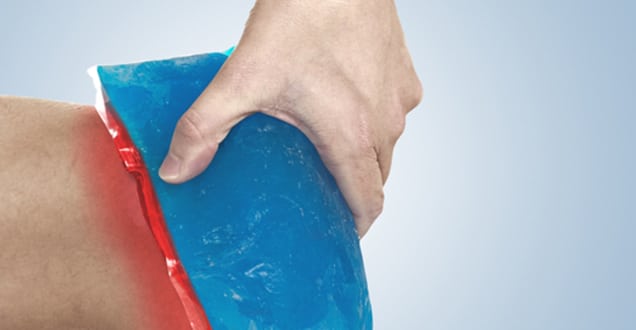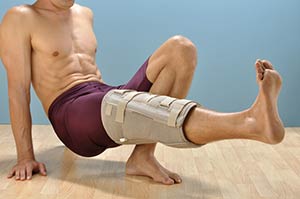
Make a visit to the knee doctor for any type of injury or pain.
Symptoms associated with knee pain often go away within 24 to 48 hours without the need for any treatment other than a little rest or some over-the-counter pain medication – but if pain becomes progressively worse or lasts longer than a few days, it’s time to see your knee doctor in Orange County.
- You may be referred to a knee doctor in Orange County for further evaluation if the source of your knee pain can’t be determined
- Contact your doctor for any type of change to your knees
CONTACT US TODAY
Sprains, Strains, and Tears
Usually the result of a sudden twist or traumatic impact, soft tissue injuries often cause pain when muscles and ligaments are stretched beyond their natural range of motion. Some patients may experience a mild or moderate strain while others may have a partial or complete tear.
Signs of a sprain, strain, or tear can include a “popping” sensation, an inability to move the affected knee without pain, or instability when trying to stand or walk. Minor injuries of this nature often respond well to the RICE formula: rest, ice, compression, and elevation. Diagnosis often includes image testing (CT scans, MRIs) while treatment typically involves a combination of medication, reconditioning, and physical therapy.
Inflammation-Related Knee Pain
Inflammation-related conditions that can affect knees are often progressive in nature, with symptoms slowly becoming more noticeable over time rather than suddenly. Arthritis is the most common of these conditions that may affect soft tissues in the knee or the knee joint itself.
Arthritis affecting the knee can take the form of osteoarthritis, a “wear and tear” type of arthritis caused by age-related degeneration of tissues. Immune system attacks often contribute to the development of rheumatoid arthritis that may affect knees. Symptoms may include swelling and “morning stiffness” that goes away gradually with normal movement.
 Tendinitis affects the tendon connecting the patella to the tibia, which connect to the knee joint. It’s usually caused by overuse, but sometimes results from an injury. If a tendon is torn, surgery is usually necessary to repair the damage, although partial tears may respond well to non-surgical treatments.
Tendinitis affects the tendon connecting the patella to the tibia, which connect to the knee joint. It’s usually caused by overuse, but sometimes results from an injury. If a tendon is torn, surgery is usually necessary to repair the damage, although partial tears may respond well to non-surgical treatments.
If the fluid-filled sacs (bursa) that cushion the knee joint become inflamed, it’s a condition called bursitis. Treatment options include anti-inflammatory drugs, injections, and surgery to remove the inflamed sac.
Chondromalacia (softening of kneecap cartilage) and osteochondritis dissecans (loss or reduction of blood supply to bones of the knee joint) are two of the most common forms of degenerative joint disease that may affect knees. Both conditions are often caused by gradual wear and tear of tissues that either directly or indirectly support the knee.
Your knee doctor will determine the extent of the damage and make treatment recommendations based on several factors. These include how the joint disorder is affecting overall knee movement and what degree of discomfort is being experienced. If degeneration from either condition is severe, surgery may be necessary to realign or reshape the kneecap. Surgery may also be recommended if bone fragments need to be removed, especially if there is nerve compression.
Bone Fractures

Hard falls and collisions may result in a bone fracture affecting the knee joint or supporting bones (femur, tibia, fibula). Fractures can range from mild to severe, depending on the extent of the damage. Patellar (kneecap) fractures, in particular, tend to be serious. The kneecap may be broken in one place or multiple locations. The fracture sometimes results in fragments breaking off. A knee doctor will use image tests to determine the most appropriate treatment. Surgical options may involve restoring stability to the kneecap and preventing damage to nearby tendons and other tissues.
Overuse Injuries
Another reason for referral to a knee doctor may be lingering pain from an overuse injury. Such injuries are often caused by repetitive motions from sports or workout routines that are especially hard on the knees. If initial rest or the application of heat or ice isn’t helping, a knee doctor may recommend muscle conditioning exercises, temporary bracing, anti-inflammatory medications, or modification of activities. A knee doctor in Orange County can also provide tips for preventing future injuries. For instance, doing a proper warm-up before running or jogging can minimize the risk of sustaining a serious injury to the muscles or ligaments that support any of the three bones that come together at the knee joint. Eating green, leafy vegetables, antioxidant-rich fruits, nuts, tomatoes, and other foods that naturally fight inflammation may also help reduce knee pain.
